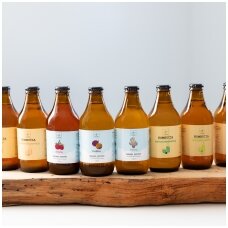Kombucha, Jun Kombucha, And Water Kefir: Main Differences And Similarities
-

Kombucha, water kefir, and Jun kombucha are among the most popular fermented drinks these days. While they may look similar at first glance, they have differences and interesting similarities that are worth exploring. In this post, we'll dive into these drinks, highlighting their main differences and similarities.
Kombucha
Ordinary kombucha is perhaps the best-known of the three. It is produced by good bacteria and yeast and is consumed and appreciated for its probiotic benefits. It is also rich in biologically active substances, such as polyphenols, which have antioxidant properties.
Characteristics of Kombucha
- Kombucha consists of tea, sugar, and SCOBY (Symbiotic Culture of Bacteria and Yeast)
- The fermentation process usually takes about a week
- Kombucha has a sour, more acidic flavour
- It is moderately carbonated
- Kombucha contains a small amount of alcohol, typically up to 1.2 %
- Contains caffeine
Jun KombuchaThis unique type of kombucha, often referred to as "kombucha champagne", is unlike traditional kombucha, which usually uses black tea and sugar, Jun kombucha is made with green tea and honey. It differs from traditional kombucha in its delicate flavour and clarity.
Characteristics of Jun Kombucha
- Jun kombucha is based on green tea and honey
- The flavour of this kombucha is both more expressive and smoother than traditional kombucha. Green tea adds a fresher flavour, and honey adds a natural sweetness, contributing to the complexity of Jun kombucha
- The fermentation process is similar to that of regular kombucha and usually takes about a week, depending on the environmental temperature.
- It is more fizzy
- Jun kombucha has a low alcohol content of up to 1.2%
- Contains caffeine
Water Kefir
Like kombucha, water kefir is a naturally carbonated, slightly sweet, and slightly creamy drink. To make it, all you need is sugar, water, and water kefir grains. These grains are not actually grains, but are polysaccharides made up of sugar-loving bacteria and yeast. They are placed in a sugar water solution and fermented for 4-7 days.
Characteristics of Water Kefir
- Water kefir consists of sugar, water, and water kefir grains
- Simple and quick to make (4-7 days, and you're ready to taste!)
- Neutral and lighter taste reminiscent of lemonade
- Lightly carbonated
- Water kefir containing less than 0.5 % alcohol
- Caffeine-free
Similarities Between Fermented Drinks
- Benefits of probiotics: They help support good gut function and the immune system. Water kefir has the highest probiotic content. They are also found in both traditional and Jun kombucha.
- Antioxidants: Kombucha and Jun kombucha have the highest antioxidant activity, while they are not found in water kefir.
- Low alcohol content: Kombucha and Jun kombucha contain up to 1.2% alcohol, while in water kefir, up to 0.5% can be formed.
- Natural carbonation: Each of these beverages is naturally saturated with carbonic acid during the fermentation process, resulting in a refreshing, effervescent beverage.
- Flavour: In traditional and Jun kombucha, the acetic acids that dominate the fermentation process give the drink a more acidic flavour. The lacto-dominant bacteria in water kefir create a creamy and refreshing drink.
- Benefits for the body: These drinks can have a number of benefits for our bodies, including better digestion and increased energy.
Kombucha, water kefir, and Jun Kombucha are wonderful fermented drinks with unique properties and flavours. Whether you prefer the classic taste of kombucha, the smooth freshness of water kefir, or the subtle and complex flavour of honey Jun kombucha? At “Tealure”, you can find kits for the production of these drinks, which will give you an even better understanding of their differences and similarities. Whichever you choose, we have no doubt that you'll immerse yourself in the world of fermentation and discover a whole new world of taste.









